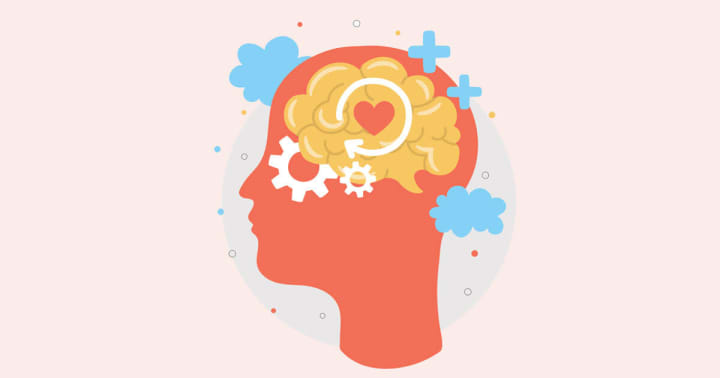The Silent Symptoms of Dementia: Watch Out for These 6 Warning Signs
And strategies to help in the early stages

Today, we will discuss the early signs of dementia. Before we delve into that, I'd like to share a story that highlights the importance of correctly identifying these signs. Often, factors like stress, fatigue, or lack of sleep can mimic dementia symptoms without actually indicating the presence of the condition. Misdiagnosis or unnecessary labeling can have detrimental effects. Allow me to recount an encounter from my practice years ago that exemplifies this situation.
I once had a couple visit my office, concerned about the early signs of dementia. During our conversation, the husband mentioned that his wife had taken it upon herself to diagnose him. Observing their interaction, I noticed the husband struggling with memory issues, and his wife constantly corrected and reminded him of his mistakes. I felt compelled to offer some candid advice. I explained that constantly pointing out errors would only reinforce them and hinder his progress. I requested the wife to refrain from correcting him for one week as an experiment. Astonishingly, when they returned after a week, the husband displayed sharp cognitive abilities and articulation, as if his previous difficulties had vanished.
This story underscores the fact that experiencing occasional signs mentioned here does not necessarily imply dementia. Various factors, such as sleep, blood sugar levels, or stress, can contribute to these symptoms. Thus, it is essential to consider multiple possibilities before jumping to conclusions. With that said, let's explore the early signs of dementia.
Difficulty organizing and planning: Struggles with organizing and planning tasks can be an early indicator. However, it's important to note that these challenges can stem from various causes.
Personality changes: While personality changes can occur in dementia, they can also arise due to other reasons, making it crucial to consider a comprehensive assessment.
Constipation: Interestingly, constipation can be among the early signs of cognitive decline. The gut-brain connection plays a significant role here since the gut contains numerous nerve fibers and the gut microbiome influences cognitive functions. However, constipation alone does not confirm dementia.
Sensory dysfunction: Early signs may include issues with smell, taste, hearing, eyesight, or appetite. These sensory challenges can be linked to cognitive decline, but they can also be caused by other factors.
Language problems: Difficulties in finding words, repeating phrases, or mixing up words can indicate cognitive impairment. The hippocampus, a brain structure, is often involved in such language issues. However, there is much more to this topic than we can cover here.
Inability to navigate in new places: Struggling to navigate and find locations, particularly in unfamiliar environments, can be an early sign of dementia. The brain's internal mapping system may be affected, resulting in challenges with spatial awareness.

Please remember that the presence of these signs does not automatically indicate dementia. To address these concerns and potentially mitigate further cognitive decline, it is crucial to take proactive steps. Here are seven recommended strategies that may help in the early stages:
- Address thiamine deficiency: A deficiency in thiamine (vitamin B1) can contribute to hippocampal atrophy, often seen in dementia. Reduce alcohol consumption and limit high-carbohydrate diets to prevent thiamine depletion. Additionally, consider taking nutritional yeast as a natural source of thiamine.
- Optimize gut health: Enhancing the diversity of the gut microbiome can have a positive impact on cognitive function. Consume a wide variety of vegetables, including sprouts, to increase fiber and phytonutrient intake. Fasting can also promote microbiome diversity. Remember, the gut-brain connection works both ways.
- Emphasize sulforaphane-rich sprouts: Consuming sprouts, especially broccoli sprouts, can provide essential nutrients and beneficial compounds like sulforaphane. Sulforaphane has been found to have neuroprotective properties and may help in reducing inflammation and oxidative stress in the brain. Including sprouts in your diet can be a simple way to support brain health.
- Stay mentally and socially active: Engaging in mentally stimulating activities such as puzzles, reading, learning a new skill, or playing musical instruments can help maintain cognitive function. Social interaction is also important, as it provides intellectual stimulation and emotional support. Consider joining clubs, volunteering, or participating in community events to foster social connections.
- Exercise regularly: Regular physical exercise has numerous benefits for brain health. It promotes better blood flow to the brain, increases the release of growth factors that support neuronal health, and reduces the risk of cardiovascular diseases that can contribute to cognitive decline. Aim for at least 150 minutes of moderate-intensity aerobic exercise per week, along with strength training exercises.
- Maintain a healthy diet: A nutritious diet is crucial for overall brain health. Focus on consuming a variety of whole foods, including fruits, vegetables, whole grains, lean proteins, and healthy fats. Incorporate foods rich in omega-3 fatty acids, such as fatty fish, walnuts, and flaxseeds. Limit processed foods, sugary snacks, and excessive salt intake.
- Get sufficient sleep: Sleep plays a vital role in memory consolidation and cognitive function. Aim for 7-8 hours of quality sleep each night. Establish a consistent sleep routine, create a comfortable sleep environment, and practice good sleep hygiene habits.
If you or a loved one are experiencing concerning cognitive changes, it is essential to consult with a healthcare professional for a comprehensive evaluation. They can help determine the underlying cause of the symptoms and provide appropriate guidance and support.
Remember, early detection and intervention are crucial in managing cognitive decline effectively. By adopting a holistic approach to brain health, incorporating healthy lifestyle habits, and seeking professional assistance when needed, you can optimize your chances of maintaining cognitive function and overall well-being.
About the Creator
Conor McKernan
An ecletic reader who writes about everything






Comments
Conor McKernan is not accepting comments at the moment
Want to show your support? Send them a one-off tip.